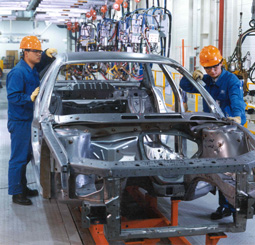I still support providing federal loans to the Big Three, but they must promise to maintain and create U.S. jobs.

On Dec. 18, General Motorsput the kiboshon a new factory in Flint, MI, that would have made engines for two of its most important new products, the Chevrolet Cruze compact and the Chevrolet Volt plug-in electric car. GM spokeswoman Sharon Basel says that development of both vehicles will continue as scheduled, and that the Flint plant delay is “probably temporary” while the company figures out its cash situation.
I can understand that. However, the day before, GM announced that it opened anew assembly plantin Shenyang, China, with its partner SAIC Motor. The $390 billion joint venture is the second facility that the two companies have opened in Shenyang. With an annual production capacity of 150,000 vehicles, the new plant will begin assembling the Cruze in the second quarter of 2009.
It’s a similar story with Chrysler, which closed all 30 of its manufacturing plants for a month starting Dec. 19.The earliest plants will reopen is Jan. 19. A few plants will reopen on Jan. 26.
In the case of some plants, such as the Toledo Jeep plant in Ohio, operations will resume Jan. 26, but with one less shift. More than 750 workers are being cut on the second shift at the Toledo North plant, which employees about 2,500. You can read about thathere.
At the same time, Chrysler has announcedthat it is now assembling the new Jeep J8 in Cairo, Egypt, at a facility it co-owns with Arab American Vehicles Co. The plant assembles some 17,600 vehicles annually. Chrysler is also building a $570 million factory near Saltillo, Mexico, that will produce 440,000 engines a year. You can read about thathere.
Certainly, neither the federal government nor I should be telling the automakers what to make or what markets to pursue. It’s wrong to criticize the Big Three for building SUVs when-let’s be honest-everyone wanted SUVs, and building them was something that they did well and profitably. Nevertheless, if they’re crying to the government over U.S. jobs, then it’s not unreasonable for us to expect that they deliver those jobs. If Japan and Europe can export vehicles to the United States, why can’t the United States export vehicles to China, Africa and the Middle East?

Recent Comments
Helpful for Trainees
Cable Assembly Manufacturers
Huawei for manufacturing?
should have a scanner and then 3D print the repair
IPC-A-610 and IPC-j-std-001